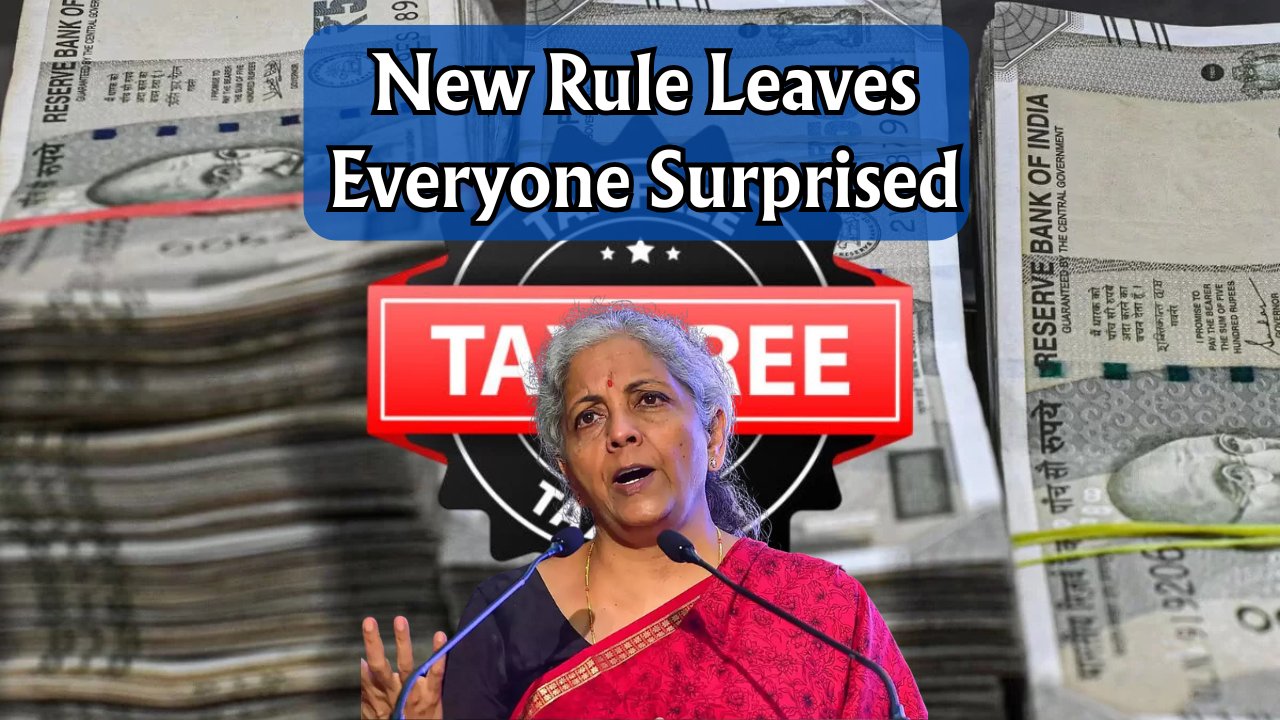New Tax Rule : The Indian government has introduced a major change in the personal income tax structure, bringing immense relief to salaried individuals. Under the revised rules, it is now possible for taxpayers to enjoy tax-free income up to ₹17 lakh. This includes a combination of deductions, exemptions, and new regime benefits. Here’s a comprehensive breakdown of how this is achievable and what you need to know to make the most of this opportunity.
What Is the New Tax Rule All About?
The new tax rule is aimed at reducing the burden on the middle-class and encouraging savings. Although the basic exemption limit under the new regime is ₹3 lakh, strategic use of exemptions and allowances can help you push your tax-free income to ₹17 lakh.
Key highlights:
- Tax-free income of up to ₹17 lakh possible for salaried employees
- Combination of deductions, rebates, and allowances
- Applies under the old tax regime
- Encourages investment in tax-saving instruments
Old vs New Tax Regime: Which One Offers ₹17 Lakh Tax-Free?
The ₹17 lakh tax-free benefit is achievable only under the old tax regime, thanks to various exemptions and deductions that are not available under the new regime.
Key Differences Between Old and New Regimes:
| Feature | Old Tax Regime | New Tax Regime |
|---|---|---|
| Standard Deduction | ₹50,000 | ₹50,000 |
| Section 80C | Up to ₹1.5 lakh | Not available |
| HRA Exemption | Available (based on rent and salary) | Not available |
| LTA, Medical, Food Coupons | Available | Not available |
| Section 80D (Health Insurance) | Up to ₹75,000 | Not available |
| Section 24(b) – Home Loan Interest | ₹2 lakh | Not available |
| Rebate under 87A | Up to ₹12,500 | Available |
| Ideal for | Those with investments & expenses | Those with no major deductions |
How to Reach ₹17 Lakh Tax-Free Income – Full Breakdown
Here’s how a salaried individual can structure their income and deductions to legally avoid paying tax on ₹17 lakh income:
| Component | Amount (₹) |
|---|---|
| Basic Salary | 10,00,000 |
| House Rent Allowance (HRA) | 2,00,000 |
| Standard Deduction | 50,000 |
| Section 80C Deductions | 1,50,000 |
| NPS (Section 80CCD(1B)) | 50,000 |
| Health Insurance (Section 80D) | 75,000 |
| Home Loan Interest (Section 24b) | 2,00,000 |
| Rebate under Section 87A | 12,500 |
Total Taxable Income After Deductions: ₹0
Total Income Before Deductions: ₹17,00,000
See more : New UPI Circle Feature Lets You Pay for Family
This structure assumes:
- You’re paying rent and claiming HRA
- You have a home loan
- You’re investing in PPF/ELSS/NPS
- You’re paying for health insurance for self and parents
Detailed Deductions That Help You Save Tax
Understanding each component is critical to maximize your savings:
1. Section 80C (Up to ₹1.5 lakh)
- PPF, EPF, ELSS, Life Insurance Premium
- Principal repayment of home loan
- Tuition fees for children
2. Section 80CCD(1B) (₹50,000)
- Additional deduction for investment in NPS
3. Section 24(b) – Home Loan Interest (₹2 lakh)
- Deduction on interest paid on home loan for self-occupied property
4. Section 80D – Medical Insurance (Up to ₹75,000)
- ₹25,000 for self/family + ₹50,000 for senior citizen parents
5. HRA Exemption
- Based on your salary, rent paid, and city of residence
Sample Salary Structure to Maximize Tax-Free Income
Here’s an ideal salary structure to benefit fully:
| Salary Component | Monthly (₹) | Annual (₹) |
|---|---|---|
| Basic Salary | 83,000 | 10,00,000 |
| HRA | 16,667 | 2,00,000 |
| Special Allowance | 4,167 | 50,000 |
| LTA | 8,333 | 1,00,000 |
| Medical Reimbursement | 1,250 | 15,000 |
| Food Coupons / Sodexo | 1,000 | 12,000 |
| Total Gross Salary | 13,77,000 | |
| Other Income (Interest/Bonus) | 3,23,000 | |
| Total Income | 17,00,000 |
With proper documentation and investment planning, the entire income can be rendered tax-free.
Who Can Take Advantage of This Rule?
This structure is especially beneficial for:
- Salaried individuals earning ₹15–17 lakh per annum
- People with home loans and rent payments
- Individuals with dependents (spouse, children, parents)
- Employees receiving allowances like HRA, LTA, food coupons
Points to Keep in Mind
- All exemptions are available only under the old regime
- Requires proper tax planning and documentation
- Must file ITR on time and declare all deductions
- Rent agreement, loan interest certificate, insurance receipts required
The ₹17 lakh tax-free income rule is not a new law but a smart structuring under existing provisions of the Income Tax Act through the old regime. With strategic planning, salaried individuals can save a massive amount in taxes. It’s crucial to understand your salary components, utilize all available deductions, and choose the regime that best suits your financial situation. Always consult a tax advisor or CA for personalized advice.
The information provided in this article is for general guidance only. Tax laws are subject to change, and individuals are advised to consult certified professionals or refer to the official Income Tax Department website for the latest updates.






